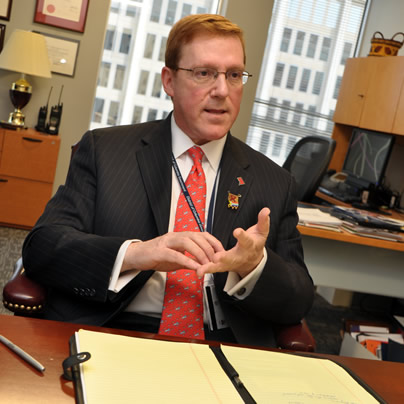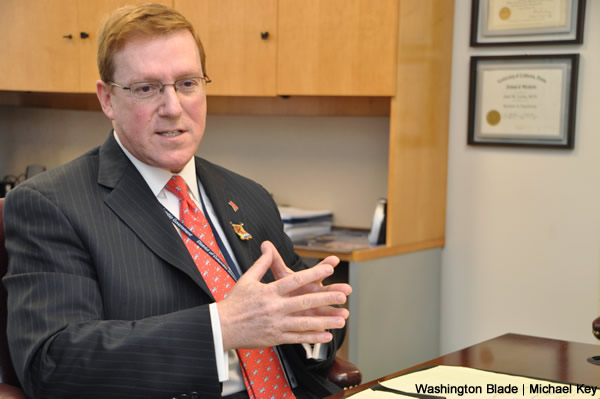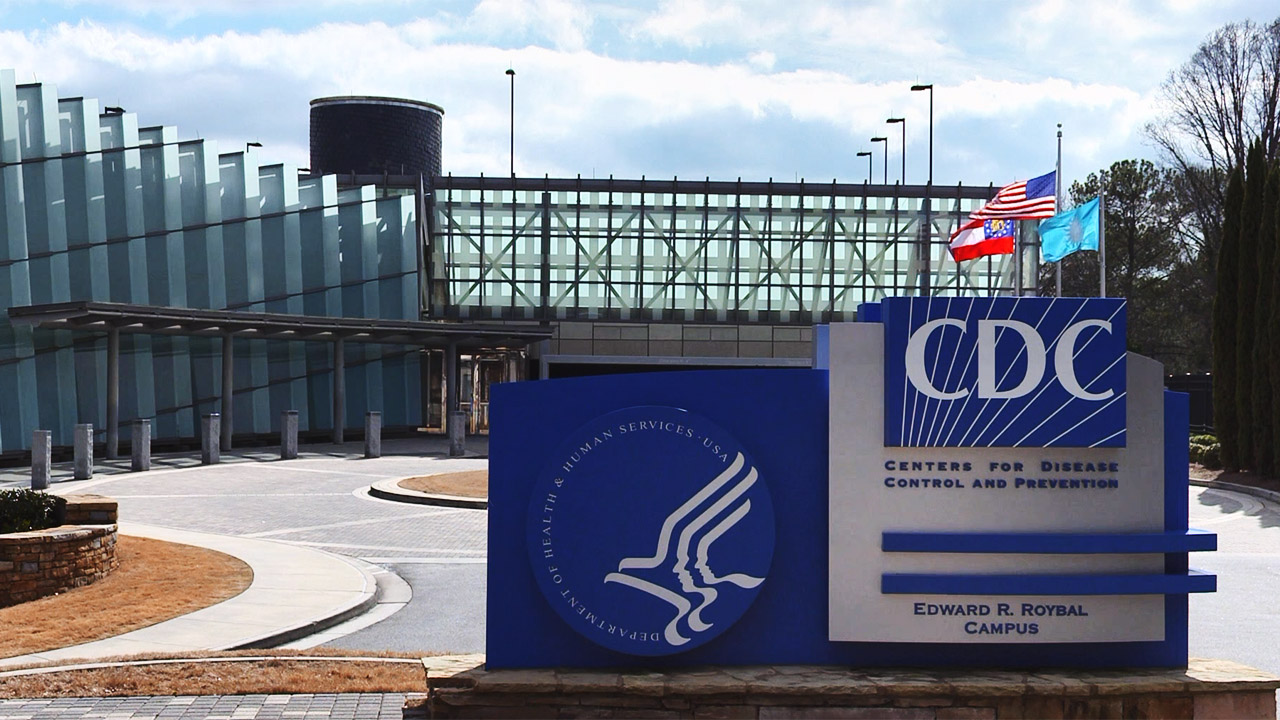Health
D.C. Dept. of Health reaches out to ‘all communities’
New gay interim director has worked on AIDS, substance abuse issues


‘My vision is that every one of us at some time is out in the community doing service work that really shows we are out there for the community,’ said Dr. Saul Levin. (Blade photo by Michael Key)
Dr. Saul Levin, the newly appointed interim director of the D.C. Department of Health, says his mission during his expected one-year tenure as head of the department is to educate the city’s diverse communities, including the LGBT community, about the wide range of services DOH offers to keep people healthy.
“One of the things I would like to put on the table is each and every one of us working here essentially comes from the community,” he told the Blade in an interview in his office. “My vision is that every one of us at some time is out in the community doing service work that really shows we are out there for the community.”
D.C. Mayor Vincent Gray on July 17 announced he had appointed Levin, a psychiatrist and senior deputy director of the DOH, as interim director, making him the first known out gay person to serve as head of a city department of that size.
A DOH spokesperson said the department has about 800 employees and a budget of about $268 million.
Gray said Levin would fill in for DOH Director Dr. Mohammad Akhter, who the mayor said is taking an unpaid leave of absence to become head of the executive board of the city’s newly created Health Benefit Exchange Authority, which is part of the Obama administration’s health insurance reform program.
In his role as senior deputy director of the DOH, Levin was in charge of the department’s Addiction Prevention and Recovery Administration, which operates the city’s programs to combat drug and alcohol abuse. He is expected to return to that post if Akhter resumes his role as DOH director.
A native of South Africa, Levin received his medical degree at a leading medical school in Johannesburg before completing his residency in psychiatry at the University of California’s Davis Medical Center.
Levin then joined the staff of the U.S. Department of Health and Human Services and later became coordinator of a special program within the department’s Substance Abuse and Mental Health Services Administration. The program integrated primary care, substance abuse, mental health and HIV/AIDS as part of an effort to improve treatment and care for people with both medical and substance abuse problems.
From there Levin returned to school, receiving a master’s degree in public administration from Harvard University’s Kennedy School of Government in 1994. Upon completion of his studies he started a health care consulting company for which he served as president for the next 10 years.
He said around 2004 he accepted an offer to become president and CEO of Medical Education for South African Blacks, a U.S.-based anti-apartheid educational trust that had provided scholarships to South African blacks prior to the end of country’s apartheid government in 1994.
Levin said leaders of the organization continued its work in the years following the apartheid system to ensure that black candidates would have the opportunity to enter jobs in the medical profession before improved educational institutions had been established in the country.
“It educated one-third of all black doctors up until six years ago,” he said. “It gave out 11,000 grants. It was truly about how someone can make a difference.”
Prior to coming to the D.C. DOH, earlier this year Levin served as vice president of the American Medical Association for Science, Medicine, and Public Health.
Levin said his involvement in AIDS-related work and the gay community began in the early 1980s during his medical school years in South Africa, when he helped to open the country’s first hospice for people dying of what was then known as “wasting disease.”
“You would just have these people who would waste away,” he said. “Their immune system would just go to pieces. So I got very involved in that way.”
Noting that he came out as gay in South Africa, Levin added, “In some ways today when you look at South Africa they have a huge problem both in the African community as well as in the white gay community” concerning AIDS. “Had they begun to see the early warning signs they could have really maybe have begun to do something a little differently to address the problem.”
Levin said the DOH’s HIV/AIDS, Hepatitis, Sexually Transmitted Disease and Tuberculosis Administration (HAHSTA) is redoubling its HIV prevention efforts directed toward black men in D.C., both gay and straight, who have the highest infection rate among all the groups at risk for HIV.
He noted that HAHSTA is headed by Dr. Greg Pappas, a gay physician with extensive experience in AIDS-related medicine and public health.
“I would say this,” Levin said in discussing the city’s programs to combat AIDS for all at-risk groups, including the gay men. “We would go anywhere and everywhere to try to get education and services to those who need it. Treatment is prevention. Prevention is treatment.”
His background in substance abuse issues and mental health has made him especially aware of substance abuse issues affecting the LGBT community, Levin said.
“I used to have a research project when I had my company, and NIH wanted me to try to get to the guys in the gym, the gay gyms,” he said. “They were exercise fanatics and the next thing I would see was photos of them out at all these parties where crystal meth and ecstasy – you name it – was used.
“And I would try to say why is it that you have so divorced yourself from your healthy bodies? You spend a lot of your life in the gym and yet you are still doing this to yourself,” he said. “Addiction is just like diabetes, hypertension or HIV. It’s a chronic relapsing treatable disease.”
Levin added that DOH offers a “full choice” treatment program for people with substance abuse problems that he highly recommends.
“Any LGBT person can come to our assistance center at 51 N St.,” he said. “It’s at the corner of First Street and N streets in Northeast. You go in there – anyone can walk in. You will be evaluated. And we will then say this is the level of care you will need,” Levin said.
“If you don’t have insurance, we will pay for it. And you will choose the program you go to.”
When told of how the recent suicide of a popular D.C. gay bartender shocked friends and co-workers, who perceived the bartender as happy and upbeat, Levin said suicide is a “difficult” issue to address.
“Someone who is clearly getting to the point of that kind of depression needs help,” he said. “Your friends can help you. Your friends and your support system and your co-workers – when you see someone becoming more depressed, not being as energetic, withdrawing from the usual things they love to do – you’ve got to address the issue,” he said.
“You know your family,” he said. “You know your partners…People do give signs when they’re thinking of suicide. You should address it.”
Health
UNAIDS to commemorate Zero Discrimination Day’s 10th anniversary
UN agency urges global action to protect human rights

As the world marks the 10th anniversary of Zero Discrimination Day; UNAIDS is sounding the alarm on the increasing threats to human rights, calling for renewed efforts to protect the rights of all individuals as a fundamental step towards ensuring health for everyone.
Established by UNAIDS a decade ago, Zero Discrimination Day aims to promote equality and fairness regardless of gender, age, sexuality, ethnicity or HIV status. The progress achieved over the past years is now in jeopardy, however, due to rising attacks on the rights of women, LGBTQ people and other marginalized communities.
UNAIDS Executive Director Winnie Byanyima emphasized the critical link between protecting human rights and safeguarding public health.
“The attacks on rights are a threat to freedom and democracy and are harmful to health,” she said in a press release. “Stigma and discrimination obstruct HIV prevention, testing, treatment and care and hold back progress towards ending AIDS by 2030. It is only by protecting everyone’s rights that we can protect everyone’s health.”
Despite challenges, there has been notable progress.
At the onset of the AIDS pandemic more than 40 years ago, two-thirds of countries criminalized consensual same-sex sexual relations. They are now decriminalized in two-thirds of countries. An additional 38 countries around the world have pledged to end HIV-related stigma and discrimination, contributing to positive changes that include 50 million more girls attending school compared to 2015.
To sustain and enhance these advancements; UNAIDS urges global support for women’s rights movements, LGBTQ rights, racial justice, economic justice, climate justice and peace initiatives. By standing with communities advocating for their rights, the U.N. aims to reinforce the collective effort towards a more inclusive and equitable world.
Zero Discrimination Day is observed on March 1.
Events and activities that will take place around the world throughout the month will serve as reminders of the essential lesson and call to action: Protecting everyone’s health is synonymous with protecting everyone’s rights.
“Through upholding rights for all, we will be able to achieve the Sustainable Development Goals and secure a safer, fairer, kinder and happier world — for everyone,” said Byanyima.
Health
New CDC report finds transgender women at higher risk for HIV
More than 1,600 people in seven cities surveyed

The Centers for Disease Control and Prevention issued a new study report this week that revealed that restricted by employment and housing discrimination and lack of access to needed gender-affirming healthcare for transgender women increasing the risk of contracting HIV.
Researchers reviewed data from a 2019-2020 survey, the National HIV Behavioral Surveillance Among Transgender Women, which found that the demographics of HIV/AIDS have been disproportionally high, especially among Black and Latina trans women, who had experienced employment and housing discrimination coupled with lack of access to gender-affirming healthcare.
The Jan. 25 Morbidity and Mortality Weekly Report was based on data studies of more than 1,600 trans women in seven major urban locales. Participants from Atlanta, Los Angeles, New Orleans, New York, Philadelphia, San Francisco and Seattle were chosen by referrals from people and community-based organizations who knew or were part of the local population of trans women.
The study’s researchers noted: “Employment discrimination occurs at the overlapping nexus of poverty, homelessness, incarceration, health insurance, disability, food insecurity and survival sex work. These issues are interconnected.”
The study stated that trans women’s inability to access quality healthcare, including gender-affirming treatment or access to PrEP, and can expose them to potential incarceration as many turn to “survival sex work” and violence, which increases the risk of contracting HIV.
The study’s author’s pointed out: “When economically marginalized transgender women are refused employment, this refusal cyclically contributes to economic hardships. This analysis …demonstrates the importance of transgender women working and living with dignity and without fear of unfair treatment.”
Health
A Whole New Perspective on Well-Being
The Mather’s team recognizes that everyone’s wellness journey is completely unique to their life experiences and influences.

It’s easy to spot the distinctive, elegant silhouette of The Mather, a Life Plan Community for those 62+ opening this spring in Tysons, Virginia. What is not apparent to the naked eye is The Mather’s unique wellness philosophy, which is literally built into the community.
The Mather’s team recognizes that everyone’s wellness journey is completely unique to their life experiences and influences.
Nature is one of the important factors that contribute to well-being. So The Mather is incorporating biophilic design—a design approach to facilitate access to nature or things that replicate natural patterns. This can include interior spaces with sightlines to a garden, choosing natural wood and stone as interior materials, or incorporating fragrant flowers and plants indoors to spark memories and provide tactile opportunities such as gardening.

“Providing biophilic design within interior settings connects residents to the natural world,” says Mary Leary, CEO and President of Mather, the organization behind The Mather. “Research shows that a connection to nature provides positive benefits to mental states and overall well-being. At The Mather, biophilic design is the intersection of buildings and programs with nature in an urban setting.”
“The Mather is attracting a diverse group of older adults,” says Mary. “As a result, we aim to incorporate wellness practices from around the world, including Wyda movement theory of the Celtic Druids, which helps people achieve harmony with nature and contentment through mindfulness.” This holistic regenerative approach is similar to Qi Gong and yoga, while born in a different part of the world. Mather Institute has a special focus on mindfulness to support older adults’ practice of present moment awareness, which can lead to increased overall well-being, compassion, and joy.
A very different example of a wellness offering at The Mather is the Gharieni Welnamis spa wave bed, which uses computer-controlled vibrational therapy and audio frequencies to train the brain to relax. “The bed increases mindfulness, concentration, and creativity—all of which support our mission of creating Ways to Age Well,SM” says Mary.
These and other personalized ways to wellness will ensure that residents of The Mather can choose from seemingly countless ways to focus on their well-being. In other words, the sky’s the limit!
-

 State Department3 days ago
State Department3 days agoState Department releases annual human rights report
-

 Maryland4 days ago
Maryland4 days agoJoe Vogel campaign holds ‘Big Gay Canvass Kickoff’
-

 Politics4 days ago
Politics4 days agoSmithsonian staff concerned about future of LGBTQ programming amid GOP scrutiny
-

 District of Columbia22 hours ago
District of Columbia22 hours agoCatching up with the asexuals and aromantics of D.C.











